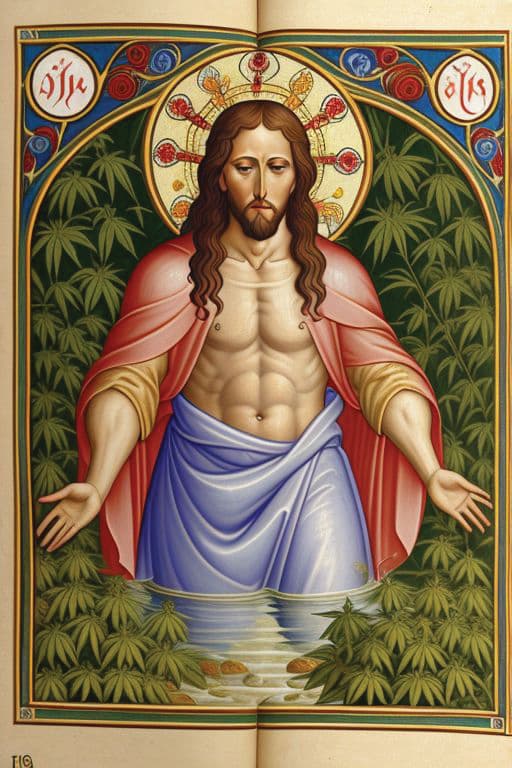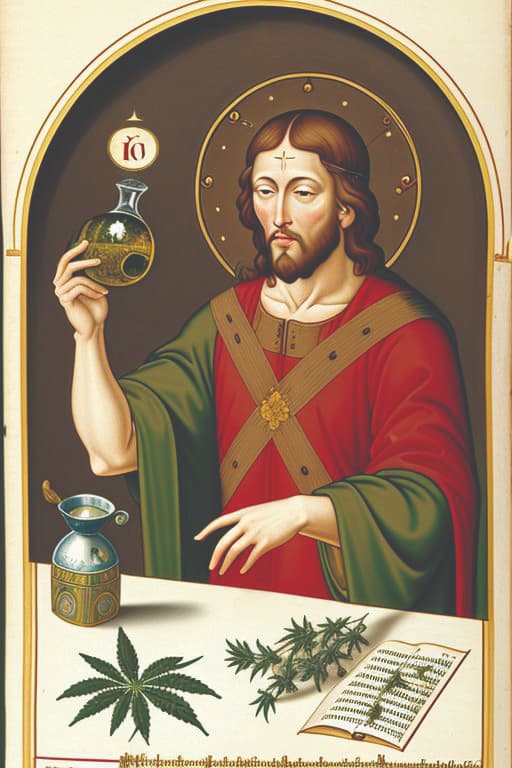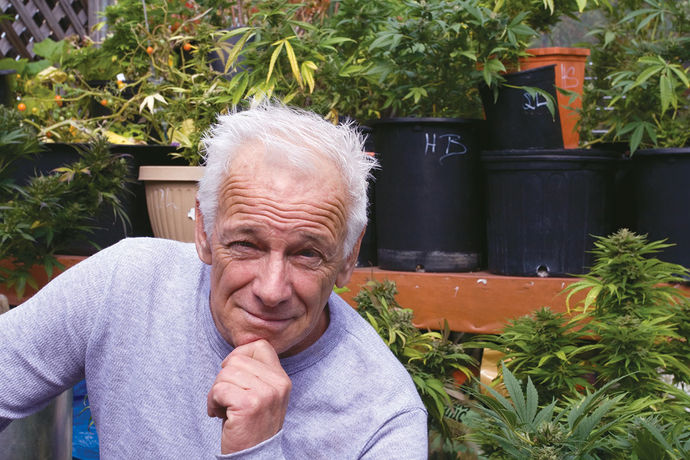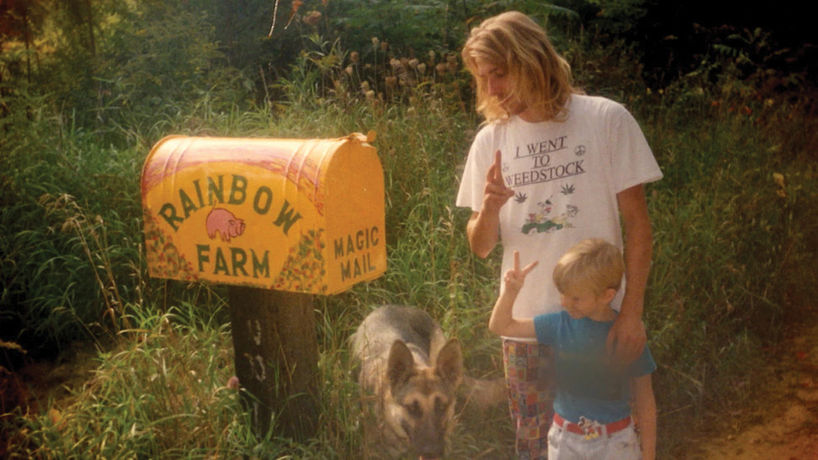Each December 25th, people around the world celebrate the beloved holiday of Christmas, commemorating the birth of the Christian savior Jesus (despite scholars agreeing that he was almost certainly not born in December).
As people around the world celebrate the beloved holiday of Christmas commemorating the birth of the Christian savior Jesus, let’s explore the possibility of a historical relationship between marijuana and the messiah.
The Anointed One
Though commonly referred to as Jesus Christ, it’s well established that his actual name was Yeshua (Jesus was the Greek translation) and that Christ was not his last name. Jews at that time didn’t really have surnames – they simply used their father’s name or land of birth as a last name (in his case, Jesus son of Joseph or Jesus of Nazareth). Christ was, in fact, not a name … but a title bestowed upon him, either by his disciples or possibly even after his death. Derived from the Greek word “Christos” meaning “anointed,” the title “Christ” literally translates as “the anointed one” or “the anointer.”
In its practical sense, “to anoint” means simply “to smear or rub with oil or liquid.” But in its religious, Biblical context, it also means to consecrate or “make holy” someone or something through ritual.
According to scripture, anointing was something that was done to Jesus, that Jesus did to others (particularly when healing the sick), and that Jesus encouraged his followers to do to themselves and others. Believe it or not, this practice – like many of Jesus’ activities – was considered radical and perhaps even heretical at that time, since God’s law expressly forbade the anointing of laypeople. Until then, only Hebraic priests and monarchs were allowed to be anointed.
The Holy Oil
So what exactly was in this sacred anointing oil (also known in some sects as the “chrism,” which bears an obvious resemblance to “Christ”) that enabled one to communicate with God? Well, it so happens that God himself dictated the exact recipe for this Holy Anointing Oil (as well as who was and wasn’t allowed to use it) when he appeared to Moses during that whole “burning bush” episode:
“Then the Lord said to Moses, ‘Take the following fine spices: 500 shekels of liquid myrrh, half as much of fragrant cinnamon, 250 shekels of q’aneh-bosm, 500 shekels of cassia … and a hind of olive oil. Make these into a sacred anointing oil, a fragrant blend … (Exodus 30:22-33)
We all know what myrrh and cinnamon are, and cassia is a tree bark very similar to cinnamon … but what the heck is q’aneh-bosm (or “kaneh bosm”), you ask? Most historians have claimed that kaneh bosm refers to the root of the Acorus calamus plant (commonly known as calamus or ‘Sweet Flag’), which has been used as an herbal remedy for gastrointestinal ailments for millennia. But as I mentioned in my June 2022 column “Kosher Kush: The History of Jews and Cannabis,” some scholars believe that kaneh bosm was, in fact, Cannabis.
It was Polish etymologist Dr. Sula Benet who first argued that the Aramaic term kaneh bosm might actually refer to Cannabis rather than calamus. In 1936, while lecturing in Warsaw, Benet claimed that, after deep comparative etymological studies, she was convinced that the term had been mistranslated during the third century AD when the Old Testament was first translated from Hebrew into Greek. She explained that the root “kan” translated to “hemp,” and bos meant “aromatic.” And since the “m” represents a pluralization, the singular would be kanehbos…which sounds remarkably similar to Cannabis. Dr. Benet’s assertion was later backed up by anthropologist Weston La Barre in 1980 and again over the past few decades by renowned scholar of Cannabis and religion Chris Bennett.
Beyond mere linguistics, it’s also been pointed out that the amount of calamus outlined in the formula – 250 shekels or roughly six pounds – would be highly toxic to humans. Six pounds of Cannabis infused into around a gallon and a half of olive oil, however, would not be harmful – and in fact, could produce quite a potent psychotropic effect … perhaps even allowing one to “see God,” so to speak.
“The skin is the biggest organ of the body, so of course, considerably more Cannabis is needed to be effective this way … much more than when ingested or smoked,” Bennet told Herb magazine in 2019. “The people who used the Holy Oil literally drenched themselves in it.”


Baptism or Chrism?
This “revelation” also shines a new light on the significance of Jesus’ baptism – the most consequential and transformative event in his life besides his crucifixion. In fact, it is Jesus’ encounter with John the Baptist where the gospels of Mark and John essentially begin.
So, it was during his baptism around the age of 30 that Jesus first heard the voice of God. And immediately thereafter, the Holy Spirit sent him out alone into the desert to fast for 40 days, where he was thrice visited by Satan. That sounds an awful lot like a shamanic vision quest – which, in Native/Pagan traditions, almost always involved ingesting some entheogen.
Which begs the question: What if it wasn’t just water that Jesus was baptized with? What if John also anointed him in Holy Oil as part of the baptism ritual? The Gnostic Gospels – a collection of texts believed to predate the New Testament gospels written by early Christian mystics – suggest that may be precisely what happened. In the book “Gnosis: The Nature and History of Gnosticism,” author Kurt Rudolph writes, “Anointing with oil has a greater representation than baptism in Gnosis, and in some texts, it is even regarded as more significant. In general, however, it is taken closely with the baptismal ceremony – the anointing taking place either before or after the baptism.”
One of the Gnostic scriptures, the Gospel of Philip, even states explicitly that it is anointing, not baptism, that makes one a Christian.
Indeed, it’s only after his baptism (a.k.a. anointing?) that Jesus begins his ministry, performs miracles, and is eventually referred to as “Christ.”
Healing of the Sick
If the Holy Anointing Oil that Jesus used on himself and others was indeed a form of Cannabis oil, it would certainly lend a level of scientific credibility to some of the visions he reportedly had, as well as the supposed miracles he performed. Among the many ailments Jesus is purported to have healed – often simply by laying his hands upon the afflicted – include leprosy, lesions, swollen muscles, blindness and demonic possession:
“And they cast out many devils, and anointed with oil many that were sick, and healed them.” (Mark 6:13)
A potent Cannabis oil applied to the skin would serve as a powerful topical medicine – allowing the body to absorb large amounts of CBD, as well as THC and other cannabinoids transdermally. Research has shown that cannabinoids have significant analgesic, anti-bacterial and anti-inflammatory properties, and have been proven effective in treating many ailments similar to those Jesus supposedly healed – including muscle pain, anxiety and glaucoma, as well as skin conditions including dermatitis, eczema, psoriasis and pruritus (which bears many similarities to leprosy). What’s more, anyone who’s seen Sanjay Gupta’s “Weed” special with Charlotte Figi on CNN knows how instantaneously and “miraculously” CBD oil can halt the seizures and shaking associated with conditions like epilepsy, rheumatism and multiple sclerosis – which, in Biblical times, might easily be mistaken for demonic possession.
Marijuana Messiah
Did Cannabis-infused anointing oil play a role in Jesus’ supposed divinity? Could it be that what early Christians perceived as being possessed by the Holy Spirit was actually just getting really, really high? Like most tales in the Bible, we may never be able to definitively prove it one way or the other. If it is true, however, that would technically make Jesus one of the very first pro-pot activists. (How’s that for a conversation starter at Christmas dinner!)
“If Cannabis was one of the main ingredients of the ancient anointing oil, and receiving this oil is what made Jesus the Christ and his followers Christians,” Bennet postulates, “then persecuting those who use Cannabis could be considered anti-Christ.”
In other words, a Christian should never be stoned for getting stoned.










